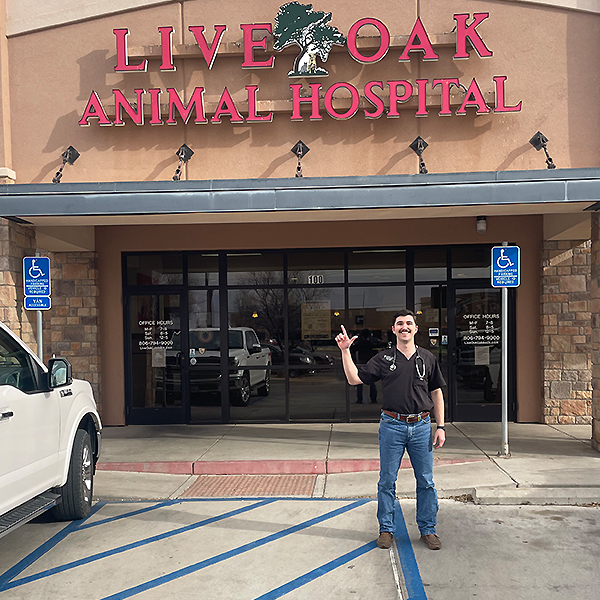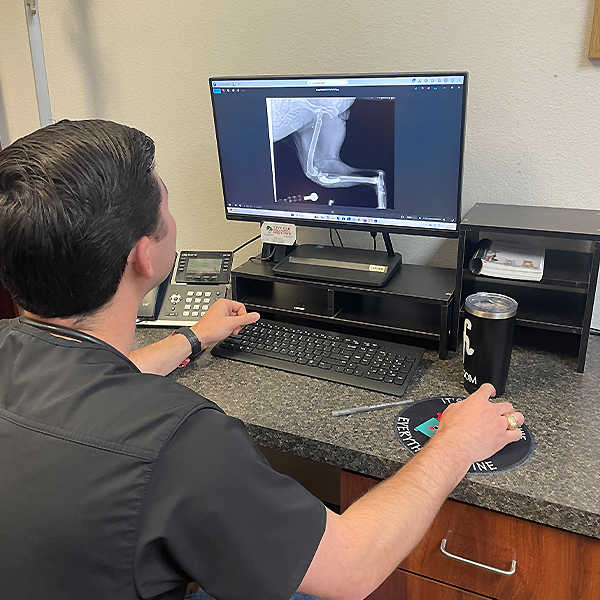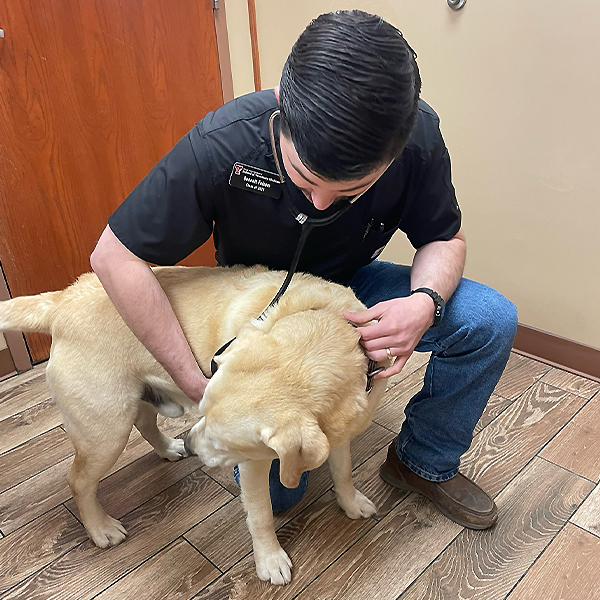
Fourth-year veterinary student shares his clinical rotation experience at Live Oak Animal Hospital.
On May 18, Bennett Folsom will officially receive his veterinary degree as part of Texas Tech University’s School of Veterinary Medicine’s first-ever graduating class.
He has had many experiences to reflect on throughout his time at the School of Veterinary Medicine such as being part of the inaugural class and helping pave the way for future veterinary students. However, one of the most fun and memorable moments of his educational journey was during his clinical year.
Throughout this fourth year, he worked with several of the school’s clinical practice partners across Texas. Spending time with a wide array of veterinary professionals has helped him feel competent and confident in his knowledge and skills.
He recently finished up a clinical rotation at Live Oak Animal Hospital in Lubbock, Texas. Let’s get an inside look into Bennett’s time there.
How has your clinical year experience been so far?
My clinical year at Texas Tech University’s School of Veterinary Medicine has been my favorite year so far. Looking back on this time, there are clear milestones of growth and development. The School of Veterinary Medicine’s model of the clinical year was one of the major attractions for me when considering attending Texas Tech against other veterinary schools. Learning in a classroom has its proper place and time, but I knew from previous opportunities that learning by doing and direct involvement is best.
The school’s clinical year has been the most intense, direct, and hands-on learning experience of all my education. It has been tremendously impactful to work side by side with doctors in their respective fields of interest and expertise, gleaning wisdom and practical experience from them, whether it be at the surgery table or exam room.
These experiences have spanned across a multitude of practices, from regional small animal surgery hospitals to specialty equine practices. I am grateful to have been guided by the exceptional doctors and staff of the clinical partners of the School of Veterinary Medicine, preparing me to graduate as a confident and day-one ready veterinarian.
How has your time at Live Oak Animal Hospital made an impact on you becoming a veterinarian?
Live Oak Animal Hospital was my ninth rotation and one of the partners that I prioritized highly when building my clinical year schedule. During my time in the Texas Panhandle, I increasingly heard positive remarks about Live Oak in Lubbock and how they served as a referral small animal hospital for many clinics in the Panhandle and eastern New Mexico. They had a reputation for not only excellence in surgery and medicine, but also volume of cases.
After completion of my rotation at Live Oak, my goals for growth and learning were accomplished above and beyond the marks I set. I was given liberty to “run my own rooms” but at the same time was given complete access to the doctors and their clinical expertise when necessary. And for surgery, my favorite, I was able to showcase skills in routine surgeries while also joining and aiding in more advanced orthopedic and soft tissue surgeries. For an example of the hands-on experience, on the first day of the rotation I found myself as lead surgeon on a femoral head ostectomy and I was thrilled.
During my four weeks at Live Oak, it was so rewarding to be a part of something bigger than myself, serving not only Lubbock citizens, but also serving those who chose to drive several hours to entrust the care of their pets to Live Oak. I left Live Oak a more confident, competent and prepared student for graduation. I owe tremendous gratitude to the doctors and staff of Live Oak for the education and growth gained during my time there.
How was it working alongside the veterinarians at Live Oak Animal Hospital?
I have been fortunate to work with a multitude of excellent doctors at all my rotations throughout clinical year. Live Oak certainly bolstered that roster. The doctors were kind, humble, and always willing to impart advice for anything I asked, from complex feline neurologic cases to new graduate financial strategies.
I especially enjoyed the depth of the doctors at Live Oak, from number of years in practice to individual areas of expertise. Thanks to these doctors, I specifically developed better medical, surgical and communication skills.
What important skills did you learn while at this rotation?
One of the unique skills I enhanced at Live Oak was client communication. As the doctors placed confidence in me, I found myself in rooms that required clear, concise language along with imparting empathy to the inherent emotions of the situation.
Several memorable cases come to mind. I was able to explain to an excited high school student and her mother about fetal mismatch and their (accidentally) pregnant Yorkshire Terrier and her necessary caesarian section (C-section).
Then there was the sweet beagle with lymphoma that I diagnosed in the clinic using skills taught in my cytology elective during my third year of veterinary school. The owner was understandably fraught with sadness which necessitated empathy as I explained our options for treatment and reassured the owner of her admirable care and love for the pet. Thanks to the doctors’ faith placed in me at Live Oak, my communication skills were sharpened and made ready for my career’s beginning in two short months.
What was your favorite part about this rotation?
My favorite part of this rotation was the responsibility to simultaneously gain experience as a “working associate” but also as a student to consult and seek wisdom in cases.
Can you talk about your excitement for graduation?
I am thrilled to be approaching graduation in less than two months. I came to school to be a part of something bigger than myself, to grow a culture, and to learn from the best and brightest minds as I prepare for a career in veterinary medicine serving rural and regional Texas. It will be a very special moment for myself, my classmates and all of those involved with the school when we cross that stage and are pronounced the first graduates of the Texas Tech University School of Veterinary Medicine.
We are the first fruits of the work of the faculty and staff of the School of Veterinary Medicine. Behind me and my classmates are hundreds of more graduates, ready to serve rural and regional Texas with grit, integrity, kindheartedness, inspiration and community. It is an honor that 60 classmates and I will be the forerunners of this tradition set by the School of Veterinary Medicine.
I am humbled by the school’s outpouring of time, wisdom and resources into us as students. It is my hope and goal to give back to this school, its values, and Texas as a veterinarian.
How do you plan serve the veterinary needs of rural and regional communities after graduation?
After graduation, I am entering the workforce serving regional Texas as a small animal practitioner with a focus in advanced surgery at Big Country Veterinary Clinic in Abilene, Texas. I am proud to join a team that serves a 300-mile region of West Texas, providing advanced surgery and medicine that otherwise is not available in rural Texas.
It is through my time at the school, specifically our experience-based clinical year, that I am confident and ready to step into my position as a veterinarian in regional Texas. It is an honor to use my scientific knowledge and skills that I gained and refined at the school to serve Texans and their pets. I could not be more proud to be a RaiderVet.
